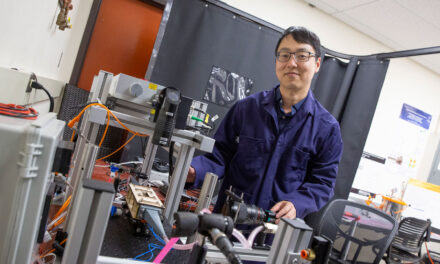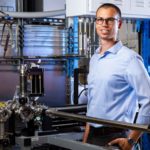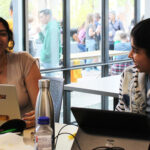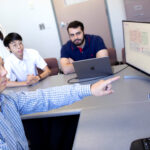
ASU Meteor Studio makes big impact at mobile computing research conference
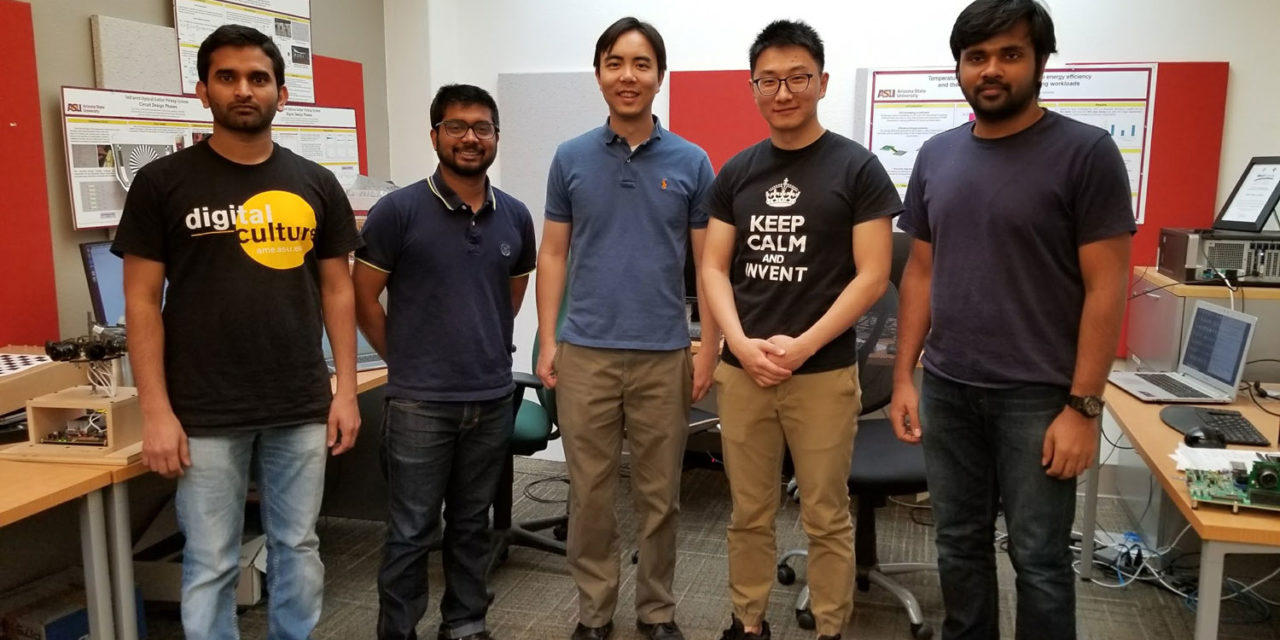
Above: Assistant professor Robert LiKamWa and his students from the Arizona State University Meteor Studio impressed the mobile computing systems international research community at the Association for Computing Machinery’s HotMobile ‘18 conference workshop, taking home a Best Poster award and getting valuable feedback on their research. From left to right: Electrical engineering graduate student Sridhar Gunnam, computer science graduate student Siddhant Prakash, Assistant Professor Robert LiKamWa, computer engineering doctoral student Jinhan Hu and computer engineering (electrical engineering) graduate student Venkatesh Kodukula. Photo courtesy of Robert LiKamWa
Arizona State University Assistant Professor Robert LiKamWa’s students in the Mobile Experiential Technology through Embedded Operations Research lab, known as Meteor Studio, shone brightly at the mobile computing systems and applications international workshop ACM HotMobile ‘18 last month, taking home a best poster award and feedback from the research community.
The Association for Computing Machinery‘s event selectively chooses research papers that explore new directions in research. Researchers come share active works-in-progress and preliminary results for early feedback from the mobile computing systems research community. Conference participants came from universities across the U.S., China, Japan, the UK, Finland and Luxembourg in addition to top industry representatives Microsoft Research and Intel Corporation.
The students authored two of the workshop’s 19 accepted papers and presented two posters out of 16 at the poster and demo sessions. Their work with the Meteor Studio’s interdisciplinary research group focuses on developing solutions to challenges in efficiently sensing, processing and acting on data gathered by sensors in many of the mobile devices we use daily.
Networking with the world’s best mobile systems researchers inspires better research
As local chair of the ACM HotMobile ‘18 organizing committee, LiKamWa brought the international workshop to Tempe, Arizona, and served on the technical program committee to select papers for the conference.
LiKamWa says the HotMobile research community, ACM SIGMOBILE, is very welcoming to young researchers and budding graduate students. Bringing the new and experienced members of the community together to discuss research also fosters innovation in mobile systems research and industry.
“Established SIGMOBILE researchers in academia and industry serve as fonts of inspiration and perspective to young researchers,” LiKamWa says. “I was happy that my students took advantage of the opportunity to network with senior researchers.”
He also believes these interactions gave his students a confidence boost, showing them that their work has the potential to create a substantial impact in mobile systems research.
“In the weeks since HotMobile, I’ve already seen them further ramp up their already-strong work ethic with confidence and enthusiasm,” LiKamWa says.
The students also enjoyed learning about the wider field of research and how the Meteor Studio fits into the industry.
“The technical talks were very rich and gave us a perspective of where we stand as a research lab in mobile systems research and I was convinced that we are tackling some of the major problems through the work we are doing here,” says Siddhant Prakash, a computer science graduate student.
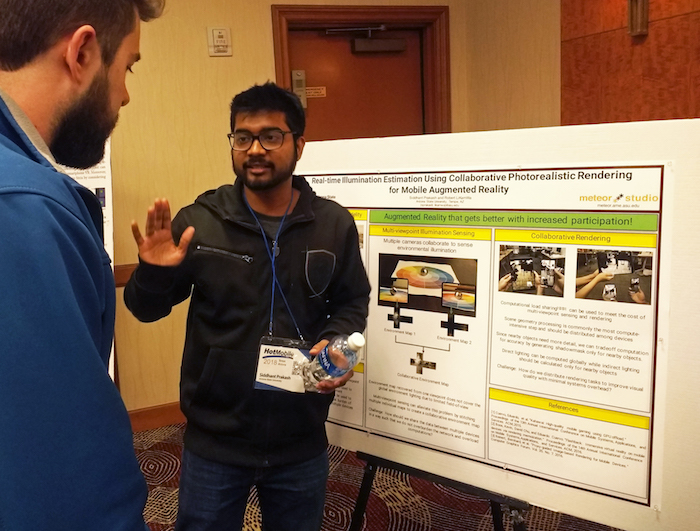
Computer science graduate student Siddhant Prakash presents his poster highlighting research on environmental sensing for mobile augmented reality applications to a fellow ACM HotMobile ‘18 attendee. Prakash won Best Poster out of 16 posters at the workshop. Photo courtesy of Robert LiKamWa.
Augmenting augmented reality
Prakash won the Best Poster award for his research with LiKamWa, “Real-time Illumination Estimation Using Collaborative Photorealistic Rendering for Mobile Augmented Reality.”
“My research aims to make augmented reality on mobile devices seem more lifelike,” Prakash says.
Augmented and virtual reality are exciting areas of research that have attracted investments by software giants Apple, Google and Microsoft. All the attention on the technologies behind AR and VR make it an opportune time to explore challenges and opportunities for optimizing performance in mobile systems.
His specific research focus is to help today’s augmented reality applications understand their surroundings better by adding elements they don’t currently have.
“In my proposed research, I want to sense the lighting environment using multiple mobile devices, and use the sensed information to render the virtual scene with lighting that matches the real lighting of the user’s environment,” Prakash says.
In his poster he illustrates the idea of multi-viewpoint sensing — using more than one mobile device to sense the surrounding environment — and collaborative rendering to share the computational burden among the multiple participating mobile devices in order to render a higher quality scene.
A highlight of Prakash’s poster demonstration was presenting his research to session judge Sharad Agarwal, a senior researcher at Microsoft Research, who complimented his work and discussed its possibilities.
Prakash was satisfied with his first conference experience and with meeting other researchers from around the globe.
“The confidence I got by just walking up to them and discussing each other’s individual research was the highlight of the event,” Prakash says. “It opened my mind to the range of problems being tackled in mobile computing, few of which I was completely unaware of.”
Prakash says he was surprised his poster received the Best Poster award.
“I was only concentrating on getting my story across to the participants and getting their honest opinion on my work,” Prakash says. “This win is a special one for me because it was my first time presenting something, or even attending a conference, in the first place. Winning a best poster award was just the icing on the cake that I wanted!”
LiKamWa commended Prakash’s effort and presentation skills, which he helped all the students practice with ASU faculty so they’d be ready for their demos.
“The Best Poster award is a wonderful recognition of Siddhant’s dedicated efforts toward his research at the intersection of computer vision and computer graphics for augmented reality. I believe it was Siddhant’s artful clarity of explanation that earned him the award,” says LiKamWa, who holds joint appointments in the ASU School of Arts, Media and Engineering and the School of Electrical, Computer and Energy Engineering in the ASU Ira A. Fulton Schools of Engineering.
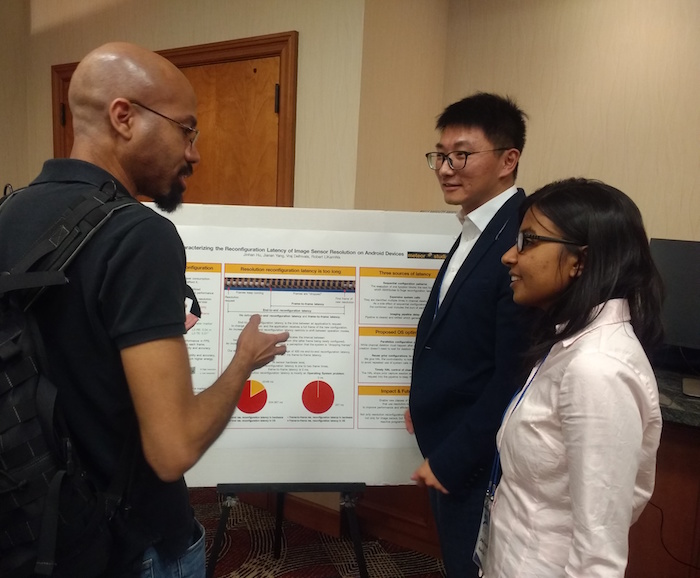
Computer engineering doctoral student Jinhan Hu (second from right) discusses his research on reducing mobile vision application power consumption with other researchers attending ACM HotMobile ‘18. Hu presented one of four demonstrations — his first public talk at a conference. Photo courtesy of Robert LiKamWa.
Making mobile vision more energy efficient
Jinhan Hu, a computer engineering doctoral student studying computer vision, had a paper accepted that details his research on reducing mobile vision power consumption for a variety of applications including augmented reality. He conducted this research, titled “Characterizing the Reconfiguration Latency of Image Sensor Resolution on Android Devices,” with LiKamWa, computer science graduate student Vraj Delhivala and recent computer engineering graduate Jianan Yang.
“Our research will reduce sensor resolution reconfiguration latency and enable new classes of vision algorithms that use a resolution-based approach to improve performance and efficiency in a variety of visual tasks,” Hu explains. “I also hope our research can be one of the foundational components of energy-efficient adaptive mobile sensing that can be implemented not only on mobile devices but also extended to other similar systems.”
Hu presented his research as one of four demonstrations at the workshop as part of his first academic conference experience, which he says was “an amazing feeling.”
“I got to network with a lot of knowledgeable professors, industry leaders and PhD student peers who are similarly pursuing greatness in their research careers,” Hu says.
Hu says he was happy to discuss his research with the international community at ACM HotMobile ‘18.
“The feedback from the community will help me rethink my research more comprehensively and motivate me to work even harder to provide deeper contributions,” he says.
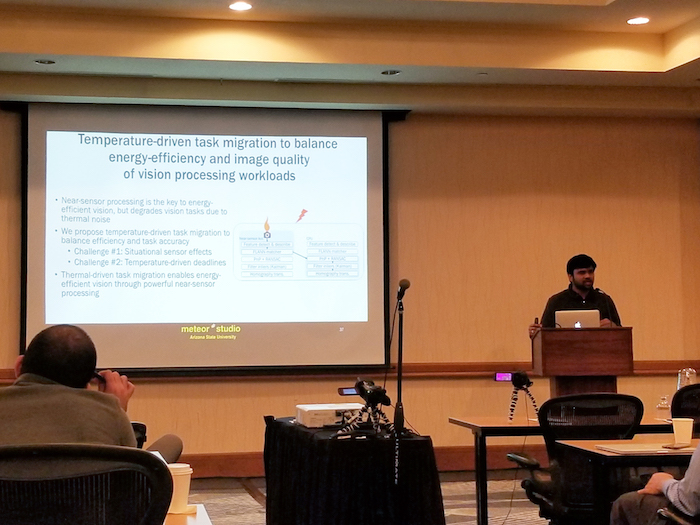
Computer engineering (electrical engineering) graduate student Venkatesh Kodukula presents his research on improvements to mobile image capture and processing systems at ACM HotMobile ‘18. Kodukula was one of the two ASU students who had papers accepted by the conference. Photo courtesy of Robert LiKamWa.
Improving processing and temperature efficiency
Venkatesh Kodukula, a computer engineering (electrical engineering) graduate student, was also happy with the feedback he received for his paper, “A case for temperature-driven task migration to balance energy-efficiency and image quality for vision processing workloads,” the second ASU paper to be accepted by the selective conference. Last year, Kodukula presented a poster on the early ideas of his research at ACM HotMobile ‘17 and won the Best Poster award. This year he presented his updated research as one of the workshop’s talks.
His research focuses on improvements to continuously recording cameras on mobile devices such as surveillance drones. Current on-system image processing methods consume a significant amount of power and result in high data rates from transferring all image data continuously across the interfaces from the sensor to the processor. One proposed solution is to push processing near the image sensor for energy efficiency. However, this technique causes heat buildup in the camera, and a hot camera produces poor image quality and impaired accuracy of vision applications.
Kodukula’s paper proposes a distributed processing method that alternates between near-sensor and far-sensor processing units based on current temperatures.
“To balance the trade-off, we propose temperature-driven task migration,” Kodukula explains. “When the camera is cool, we perform near-sensor processing with strong thermal coupling. When the camera becomes hot, we offload some processing to the thermally isolated host to alleviate the sensor’s thermal stress. Our policies enable energy-efficient near-sensor processing without compromising the task accuracy.”
Kodukula says having his paper accepted means the community finds his research interesting.
“The review comments I received for my paper are encouraging and helpful to advance my research,” Kodukula says. “All these experiences really mean a strong positive vibe for a young researcher like me.”



